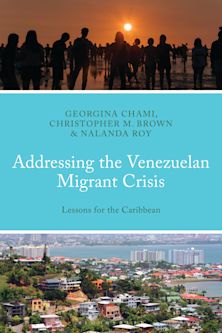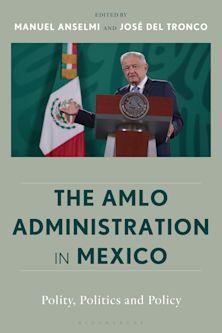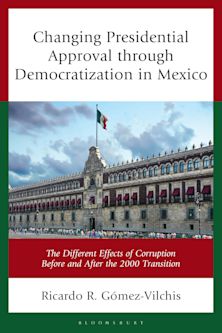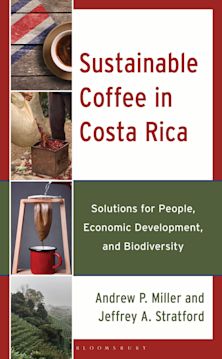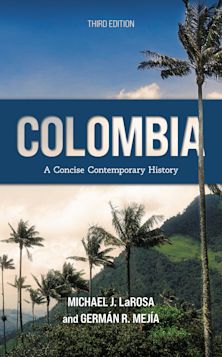A Contemporary Cuba Reader
The Revolution under Raúl Castro
Philip Brenner (Anthology Editor) , Marguerite Rose Jiménez (Anthology Editor) , John M. Kirk (Anthology Editor) , William M. LeoGrande (Anthology Editor)
- Textbook
A Contemporary Cuba Reader
The Revolution under Raúl Castro
Philip Brenner (Anthology Editor) , Marguerite Rose Jiménez (Anthology Editor) , John M. Kirk (Anthology Editor) , William M. LeoGrande (Anthology Editor)
- Textbook
Description
Cuba has undergone dramatic changes since the collapse of European communism. The loss of economic aid and preferential trade with the Soviet Union and other Eastern bloc countries forced the Cuban government to search out new ways of organizing the domestic economy and new commercial relations in an international system dominated by market economies. The resulting economic reforms have reverberated through Cuban society and politics, recreating social inequalities unknown since the 1950s and confronting the political system with unprecedented new challenges. The resulting ferment is increasingly evident in Cuban cultural expression, and the responses to adversity and scarcity have reshaped Cuban social relations.
This completely revised and updated edition focuses on Cuba since Raúl Castro took over the country’s leadership in 2006. A Contemporary Cuba Reader brings together the best recent scholarship and writing on Cuban politics, economics, foreign relations, society, and culture in present-day Cuba. Ideally suited for students and general readers seeking to understand this still-contentious and controversial island, the book includes a substantive introduction setting the historical context, as well as part introductions and a chronology.
Supplementary resources for students and professors are available here.
Contributions by: Carlos Alzugaray Treto, Denise Blum, Philip Brenner, Michael J. Bustamante, Mariela Castro, Soraya M. Castro Mariño, María Auxiliadora César, Armando Chaguaceda, Margaret E. Crahan, Simon C. Darnell, Antonio Aja Díaz, Jorge I. Domínguez, María Isabel Domínguez, Tracey Eaton, H. Michael Erisman, Richard E. Feinberg, Reina Fleitas Ruiz, Edmundo García, Graciela González Olmedo, Conner Gorry, Katrin Hansing, Adrian H. Hearn, Ted A. Henken, Rafael Hernández, Monica Hirst, Robert Huish, Marguerite Rose Jiménez, Antoni Kapcia, C. William Keck, Emily J. Kirk, John M. Kirk, Hal Klepak, Sinan Koont, Par Kumaraswami, Saul Landau, William M. LeoGrande, Sandra Levinson, Esteban Morales, Nancy Morejón, Blanca Múnster Infante, Armando Nova González, Manuel Orozco, Leonardo Padura Fuentes, Omar Everleny Pérez Villanueva, Philip Peters, Camila Piñeiro Harnecker, Clotilde Proveyer Cervantes, Archibald Ritter, Ana M. Ruiz Aguirre, Daniel Salas González, Jorge Mario Sánchez Egozcue, Ann Marie Stock, Julia E. Sweig, Carlos Varela, Sjamme van de Voort, and María del Carmen Zabala Argüelles.
Table of Contents
Part I: Politics
Chapter 1: Continuity and Change in Cuba at Fifty: The Revolution at a Crossroads, Carlos Alzugaray Treto
Chapter 2: Cuba’s New Socialism: Different Visions Shaping Current Changes, Camila Piñeiro Harnecker
Chapter 3: After Fidel: The Cuban Communist Party on the Brink of Generational Change, William M. LeoGrande
Chapter 4: The Revolutionary Armed Forces: Loyalty and Efficiency in the Face of Old and New Challenges, Hal Klepak
Chapter 5: The Collapse of Socialism Is beyond the Present Horizon, Rafael Hernández, Interviewed by Edmundo García
Chapter 6: Religion and Civil Society in Cuba, 1959–2013, Margaret E. Crahan
Chapter 7: From Cyberspace to Public Space?: The Emergent Blogosphere and Cuban Civil Society, Ted A. Henken and Sjamme van de Voort
Chapter 8: The Promise Besieged: Participation and Autonomy in Cuba, Armando Chaguaceda
Part II: Economics
Chapter 9: Challenges of Economic Restructuring in Cuba, Jorge Mario Sánchez Egozcue
Chapter 10: Updating the Cuban Economic Model, Omar Everleny Pérez Villanueva
Chapter 11: Cuba’s Entrepreneurs: Foundation of a New Private Sector, Philip Peters
Chapter 12: Cuban Agriculture and the Current Process of Economic Transformation, Armando Nova González
Chapter 13: The New Cuban Economy: What Roles for Foreign Investment? Richard E. Feinberg
Chapter 14: The Political Economy of Leisure, Marguerite Rose Jiménez
Chapter 15: Remittance Recipients and the Present and Future of Microentrepreneurship Activities in Cuba, Manuel Orozco and Katrin Hansing
Chapter 16: Poverty and Vulnerability in Cuba Today, María del Carmen Zabala Argüelles
Chapter 17: Economic Illegalities and the Underground Economy in Cuba, Archibald Ritter
Part III: Foreign Policy
Chapter 18: Raúlista Foreign Policy: A Macroperspective, H. Michael Erisman
Chapter 19: China and the Future of Cuba, Adrian H. Hearn
Chapter 20: Cuban–Latin American and Caribbean Relations: Challenges Beyond, Monica Hirst
Chapter 21: Cuban Medical Internationalism under Raúl Castro, John M. Kirk
Chapter 22: Cuban Public Diplomacy, Michael J. Bustamante and Julia E. Sweig
Chapter 23: The Cuban Five and the U.S. War against Terror, Saul Landau
Chapter 24: Untying the Knot: The Possibility of a Respectful Dialogue between Cuba and the United States, Philip Brenner and Soraya M. Castro Mariño
Chapter 25: Emigration and U.S.-Cuba Bilateral Relations, Antonio Aja Díaz
Chapter 26: Dialogues within and between Cuba and Its Diaspora, Jorge I. Domínguez
Chapter 27: Cuba, a Country with a Broken Heart, Leonardo Padura Fuentes
Part IV: Culture
Chapter 28: Living and Creating in Cuba: Risks and Challenges, Leonardo Padura Fuentes
Chapter 29: A Black Woman from Cuba, That’s All: An Interview with Nancy Morejón, Nancy Morejón
Chapter 30: Two Songs, Carlos Varela
Chapter 31: Culture for the Masses? Daniel Salas González
Chapter 32: Nationhood and Identity in Contemporary Cuban Art, Sandra Levinson
Chapter 33: Questioning Authority: Cultural Expression of Contemporary Cuban Youth, Ana M. Ruiz Aguirre
Chapter 34: Zooming In: Making and Marketing Films in Twenty-First-Century Cuba, Ann Marie Stock
Chapter 35: Recovering from Crisis?: Literature, Publishing, and Nation Building in Contemporary Cuba, Par Kumaraswami and Antoni Kapcia
Chapter 36: Cuban Sport Development: Building Capacity from el Parque to the Podium, Robert Huish and Simon C. Darnell
Part V: Social Change
Chapter 37: Cuban Youth: From the “Special Period” to the “Updating” of the Economic and Social Model, María Isabel Domínguez
Chapter 38: Notes on the Race Question in Cuba Today, Esteban Morales
Chapter 39: Memorable Characters of Cuba, Tracey Eaton
Chapter 40: Cuba’s Recent Embrace of Agroecology: Urban and Suburban Agriculture, Sinan Koont
Chapter 41: The Cuban Health System: In Search of Quality, Efficiency, and Sustainability, Conner Gory and C. William Keck
Chapter 42: Fifty Years Later: Women and Social Change in Cuba, Clotilde Proveyer Cervantes, Reina Fleitas Ruiz, Graciela González Olmedo, Blanca Múnster Infante, and María Auxiliadora César
Chapter 43: Cuban Educational Reform during the "Special Period": Dust, Ashes, and Diamonds, Denis Blum
Chapter 44: The Changing Dynamics of Sexuality: CENESEX and the Revolution, Emily J. Kirk
Chapter 45: Transcript of Television Interview with Mariela Castro, Amy Goodman
Chapter 46: Surfing Revolico.com: Cuba’s Answer to Craig’s List, John M. Kirk
Cuba Chronology: 2006–2013
Product details
| Published | 07 Jul 2014 |
|---|---|
| Format | Ebook (PDF) |
| Edition | 2nd |
| Extent | 1 |
| ISBN | 9798216250661 |
| Imprint | Rowman & Littlefield |
| Publisher | Bloomsbury Publishing |












